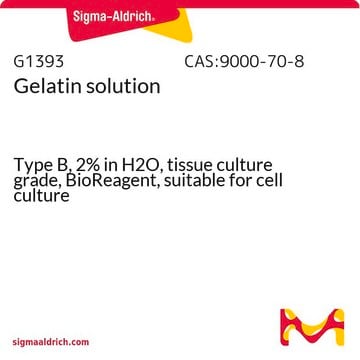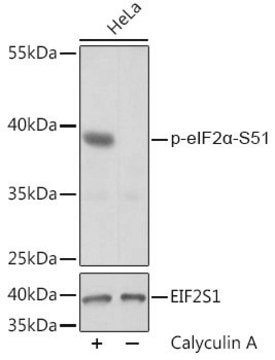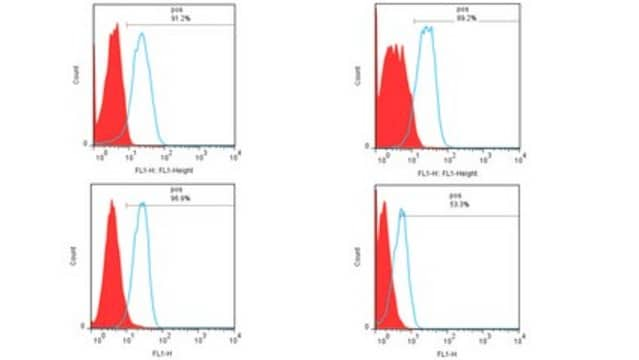推荐产品
生物源
rabbit
品質等級
抗體表格
affinity isolated antibody
抗體產品種類
primary antibodies
無性繁殖
polyclonal
純化經由
affinity chromatography
物種活性
human
物種活性(以同源性預測)
rat (based on 100% sequence homology), bovine (based on 100% sequence homology), Drosophila (based on 100% sequence homology)
包裝
antibody small pack of 25 μL
製造商/商標名
Upstate®
技術
ChIP: suitable (ChIP-seq)
immunofluorescence: suitable
immunoprecipitation (IP): suitable
western blot: suitable
同型
IgG
NCBI登錄號
UniProt登錄號
運輸包裝
ambient
目標翻譯後修改
phosphorylation (pSer51)
基因資訊
Drosophila melanogaster ... Eif2Alpha(32617)
一般說明
Nuclear receptor subfamily 5 group A member 2 (UniProt: O00482; also known as Alpha-1-fetoprotein transcription factor, B1-binding factor, hB1F, CYP7A promoter-binding factor, Hepatocytic transcription factor, Liver receptor homolog 1, LRH-1) is encoded by the NR5A2 (also known as B1F, CPF, FTF) gene (Gene ID: 2494) in human. It is a member of the nuclear receptor superfamily that binds to the sequence element 5′-AACGACCGACCTTGAG-3′ of the enhancer II of hepatitis B virus genes. It contains a DNA binding region (aa 83-104) and two NR C4-type zinc finger domains (aa 86-106 and 122-146). It is abundantly expressed in pancreas, but at reduced levels in liver, and at very low levels in heart and lung. It s expression has been demonstrated in the Hep-G2 cell line. Four different isoforms of LRH-1 have been described that are generated by alternate splicing. LRH-1 is reported to be involved in the regulation of expression of transcription factors, such as Oct4, HNF1, 3, and 4, which are known to participate in embryonic development. Its presence in high levels in beta-III Tubulin+ and NeuN+ neurons of the mantle zone (MZ) in early neural tube of mice (E10.5 and E12.5) indicate its involvement in neural differentiation. (Ref.: Stergiopoulos, A., and Politis, PK (2016). Nat. Commun. DOI: 10.1038/ncomms12230; Venteclef, N et al. (2008). J. Biol. Chem. 283(7); 3694 3701).
特異性
This rabbit polyclonal antibody detects elf-2 alpha phosphorylated on Serine 51 in human.
免疫原
Epitope: N-terminus
KLH-conjugated linear peptide corresponding to 13 amino acids surrounding phosphorylated ser51 of human Eukaryotic translation initiation factor 2 subunit 1.
應用
Anti-phospho-eIF-2 (Ser51), Cat. No. 07-760-I, is a rabbit polyclonal antibody that detects Eukaryotic translation initiation factor 2 subunit 1 and has been tested for use in Peptide Inhibition Assay and Western Blotting.
Peptide Inhibition Assay: A 1:1,000 dilution from a representative lot detected phospho-eIF-2 (Ser51) in HeLa treated Calyculin A.
Research Category
Signaling
Signaling
品質
Evaluated by Western Blotting in HeLa treated with Calyculin A cell lysate.
Western Blotting Analysis: A 1:1,000 dilution of this antibody detected phospho-eIF-2 (Ser51) in HeLa treated with Calyculin A cell lysate.
Western Blotting Analysis: A 1:1,000 dilution of this antibody detected phospho-eIF-2 (Ser51) in HeLa treated with Calyculin A cell lysate.
標靶描述
~38 kDa observed; 38.65 kDa calculated. Uncharacterized bands may be observed in some lysate(s).
外觀
Affinity Purified
Purified rabbit polyclonal antibody in buffer containing 0.1 M Tris-Glycine (pH 7.4), 150 mM NaCl with 0.05% sodium azide.
儲存和穩定性
Stable for 1 year at 2-8°C from date of receipt.
其他說明
Concentration: Please refer to lot specific datasheet.
法律資訊
UPSTATE is a registered trademark of Merck KGaA, Darmstadt, Germany
免責聲明
Unless otherwise stated in our catalog or other company documentation accompanying the product(s), our products are intended for research use only and are not to be used for any other purpose, which includes but is not limited to, unauthorized commercial uses, in vitro diagnostic uses, ex vivo or in vivo therapeutic uses or any type of consumption or application to humans or animals.
未找到合适的产品?
试试我们的产品选型工具.
儲存類別代碼
12 - Non Combustible Liquids
水污染物質分類(WGK)
WGK 1
Kristin L Rosche et al.
mSphere, 8(5), e0032123-e0032123 (2023-09-21)
A crucial phase in the life cycle of tick-borne pathogens is the time spent colonizing and persisting within the arthropod. Tick immunity is emerging as a key force shaping how transmissible pathogens interact with the vector. How pathogens remain in
Rebekah Koppenol et al.
Brain : a journal of neurology, 146(6), 2346-2363 (2022-12-14)
Polyglutamine diseases are a group of neurodegenerative disorders caused by an abnormal expansion of CAG repeat tracts in the codifying regions of nine, otherwise unrelated, genes. While the protein products of these genes are suggested to play diverse cellular roles
我们的科学家团队拥有各种研究领域经验,包括生命科学、材料科学、化学合成、色谱、分析及许多其他领域.
联系技术服务部门








